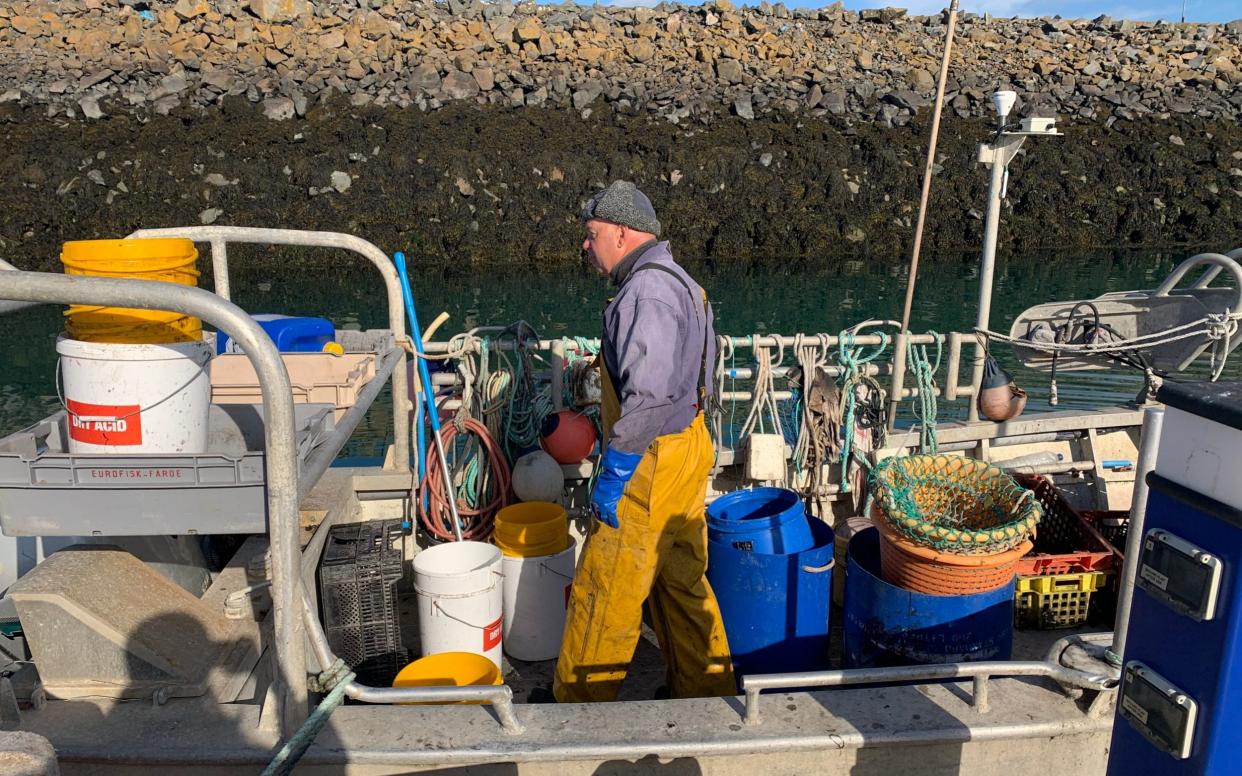French authorities ban Jersey fishermen from landing catch at three ports

French authorities have announced that Jersey fishermen will be banned from landing their catch at three ports in response to the row over post-Brexit fishing rights.
In a tit-for-tat retaliation, local leaders in La Manche, Normandy, said that boats from the Channel island would be suspended from entering the ports of Granville, Barneville-Carteret and Dielette until further notice.
It came as Jersey fishermen on Friday told The Telegraph they had been unable to land their hauls since Monday, with one fisherman actively prevented from landing in Carteret on Thursday afternoon.
Responding on Friday night, Ian Gorst, Jersey’s minister for external relations, said that it regretted the decision and believed it fell foul of the Brexit trade deal.
“For that reason we are referring the notice of this decision immediately to the European Commission,” he said in a statement.
It follows Jersey’s decision last week to impose new restrictions on fishing licences granted to French vessels in its waters, in a move which has provoked outcry in Paris.
Brussels has also intervened, claiming that the move is discriminatory and in breach of the Brexit trade deal agreed with the UK last year.
After the French government threatened to cut off electricity supplies to the island, a flotilla of 60 fishing boats blockaded its main port of St Helier on Thursday, in an escalation which prompted Boris Johnson to dispatch two Royal Navy vessels.
The fishermen have threatened to return unless Jersey backs down, but Downing Street has insisted that the Crown Dependency commands its full support and has complied with the trade agreement.
Read more: Calm after the storm as Jersey's fishermen head back out to sea
However, it now appears that Jersey’s fishermen are bearing the brunt of France’s anger.
Speaking to The Telegraph on Friday, Ian Gorst, Jersey’s external relations minister, said: “It’s not fair our fishermen are being blocked.
"We want to work to solve the problem for the licences. We really don't believe it's a problem of our making, but you need to make sure that member states are allowing access to the market appropriately.”
Asked why Jersey fishermen are being caught up in the situation he said "sadly that's inevitable and that's why it's a bit frustrating to have all the drama".
Mr Gorst told The Telegraph he had previously delivered a “dossier” of the issues facing Jersey fishermen to the EU Fisheries Commissioner and things had started to get better but now they’ve “dropped off a cliff again”.
Local fishermen said they had already been prevented from landing their catch of whelks and scallops for months, due to the imposition of an EU-wide ban on the export of live bivalve molluscs from Britain’s class B waters.
Don Thompson, chair of the Jersey Fishermen's Association, said: “The real hardship genuinely is on this side and I'm seeing my colleagues going out of business, fishermen that have done nothing else all their life, made a commitment to the industry since they were very young, having to sell their boats and walk away from the industry."
Leon Dessoude, a commercial fisherman in Jersey for 15 years, said “it’s got to be access for access”.
“If you’ve got issues you’ve got to be able to talk to about it, all of this coming over here with an Armada and threatening to close the ports (doesn’t help),” he said.
Meanwhile, EU sources said on Friday night said that a number of European countries were now discussing potential retaliatory measures, should their fishermen also face similar restrictions.
Germany, Netherland, Spain, Portugal, Denmark, Ireland and Belgium are the EU countries with the greatest fishing interest in UK waters.
One diplomat said the issue had been touched upon in a working group and that the issue of historic licences would be looked into more deeply in a future meeting of envoys.
"The concern among fishing nations is quite big [...] there is also talk of retaliation if the UK continues to interpret the fishing agreement in a rather lofty and disingenuous fashion” they added.
“That is how it is seen here in Brussels and French fishermen don't like to be messed with.”
A second said: "There is anxiety that the UK will try to skirt what was agreed under the trade deal.
“This is apparently a localised problem associated with local Jersey legislation. So no problem for us yet. This will change if this is translated into a wider Channel policy and or French fishermen start blocking European colleagues in other waters having lost access to the British waters.”
There are a series of dispute resolution mechanisms in the trade deal but ultimately the EU could freeze parts of the deal or impose tariffs if the row is not resolved. There are also a string of other trade areas where the UK is dependent on EU approval for exports.

 Yahoo News
Yahoo News 
